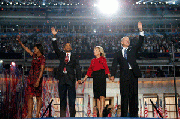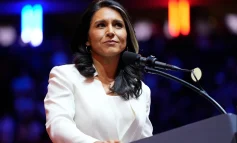
Election stirs hopes, fears in U.S. Iraqis
WASHINGTON (IPS) — As the November election nears, Iraqis in the United States appear divided over their preferences for the next U.S. president, according to a series of interviews carried out by IPS.
Some see in Sen. John McCain, the presumed Republican candidate who has opposed a specific timeline for the withdrawal of the 144,000 U.S. combat troops deployed to their homeland, a guarantee against the return of chaos and instability in the country.
Others support Sen. Barack Obama, who has been crowned as the Democratic candidate at the party’s convention in Denver this week, because of his desire to withdraw all U.S. combat forces within 16 months of his taking office, and his softer stance on issues like immigration.
“My loyalty is for this country and domestic issues really concern me,” said Hala, a software engineer who has been living in the U.S. with her family for 22 years, and who asked to be identified by her first name only.
“I support Obama for his domestic and foreign policy,” she said. “Four years ago, I voted for Republicans for their stance on Iraq. Now Iraq is more stable and my anxiety no longer exists.”
At the time of the 2000 census, about 89,000 Iraqis lived in the United States. That number represented only 0.3 percent of all foreign-born people living here. According to Refugee International, 13,754 Iraqi refugees have come to the U.S. from 2001 to 2008.
The debate here has been influenced in recent weeks by ongoing negotiations between the administration of U.S. President George W. Bush and Iraqi Prime Minister Nouri al-Maliki over formal agreements regarding the future status of U.S. troops.
Like McCain, Bush has wanted to condition any future military withdrawal on improvements in the security situation. He has also demanded legal immunity for U.S. soldiers and other personnel accused of crimes in Iraq.
Al-Maliki, on the other hand, has reportedly pushed for setting a deadline for the withdrawal of all combat troops. Some observers say that Maliki’s position — which is much closer to Obama’s — is being driven by popular opposition to the retention of U.S. forces in Iraq.
Steven Kull, director of the international research consortium WorldPublicOpinion.org, told IPS, “Iraqis want a timeline. They do not resonate with McCain’s idea of an open-ended U.S. military presence in Iraq.”
In recent Congressional testimony, Kull noted that a poll conducted by the ORB in March 2008, for the British Channel 4, found that 70 percent of Iraqis said that they wanted the Multi National Forces to withdraw, 84 percent of this group wanted to see them leave in a year, and 78 percent wanted them out as early as within six months.
Still, IPS interviews with numerous Iraqis in the United States, of different sects, ages, and genders, reveal mixed feelings for a withdrawal as early as next June, and the opposing timetables represented by McCain and his Democratic rival, Barack Obama.
“I am so sad to say it, but I think that McCain would be better for the future of Iraq, especially since my family and friends are still living there,” Bassam Sebti, a 28-year-old Iraqi who has lived in the United States for two years, told IPS.
“I’m a taxpayer now. Obama is better for the U.S., but not for Iraq,” said Sebti, who is an editor at the International Centre for Journalists and lives in Washington.
Iraqi officials are eager for a withdrawal timetable and have requested that the U.N. Security Council mandate not be renewed after it expires by the end of this year. Shi’a cleric Muqtada al-Sadr has agreed to disband his Mahdi army if a palatable agreement is reached.
Some 144 out of 275 members of the Shi’a-dominated Iraqi parliament have signed a letter demanding a timetable for the U.S. withdrawal.
However, some Iraqis fear that the resulting security vacuum would lead to increased sectarian violence.
Naseer Nori, 51, came with his family to the U.S. in May under the Iraqi refugee resettlement program. “Iraqis back home prefer McCain — they do not want an early withdrawal, which will only leave the country in the hands of militias and political parties that will fight with each other,” he told IPS. “We do not have a strong military to stop that.”
Other Iraqis here believe that Obama would be better on U.S. domestic policy, especially treatment of immigrants and refugees, and have no confidence in McCain’s policies toward their homeland.
Suhail Ahmed, a 55-year-old Sunni translator, also moved here with his family in May. Asked to assess the candidates, he responded wryly: “A milkmaid will never tell you that her yogurt is sour.”
Ahmed noted that the Republicans have never admitted that they made mistakes in Iraq. “People back home are tired, and the Republicans will follow the same footsteps of Bush — nothing good will happen to Iraq if McCain wins,” he said.
Omar Fekeiki, a 30-year-old Iraqi editor living in the U.S. for two years, has been following the U.S. electoral campaign carefully and is looking forward to seeing who the next president will be.
“Ever since I was a child, I’ve always had this image about the U.S. — it’s the land of equality,” he said.
Fekeiki said he was eager to see Obama lead the United States for the next four years.
Like many other secular Iraqis, Fekeiki believes that separating mosque from state is the only way to restore normal life in Iraq. And U.S. support for the Iraqi religious government has played a big role in destabilizing the country, he added. “The troops are dying for no reason,” he said.






Leave a Reply